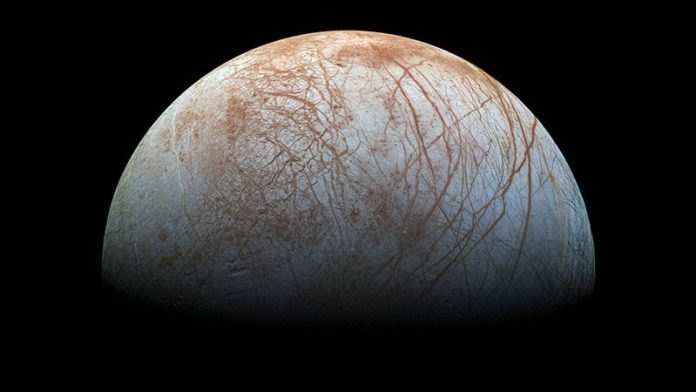Europa, one of the largest satellites of Jupiter has a thick water-ice crust and a vast subsurface saltwater ocean beneath its icy surface hence suggested to be one of the most promising places in the solar system to harbour some form of life beyond Earth. A recent study based on direct observation by Juno mission to Jupiter has revealed that the oxygen production on Europa surface is substantially low. This may mean much reduced oxygen delivery from the oxygenated ice to the liquid ocean below the surface and a narrower range to support life in Europa’s Ocean. The forthcoming Europa Clipper mission is expected to shed more light on possibility of finding some lifeform in Europa’s ocean. Any future finding of primitive microbial life in Europa’s ocean would, for the first time, demonstrate independent emergence of life at two different places in the universe.
Physics and chemistry are understood in the same way everywhere, but biology may not. On earth, life is carbon-based and requires liquid water as the solvent of the building blocks of life (including carbon, hydrogen, nitrogen, oxygen, phosphorus, and sulphur), and an energy source. Most of the energy comes from the Sun following trapping by the plants through photosynthesis and made available through respiration in the presence of oxygen. Some lifeforms on earth such as archaea, however, may use other energy sources. And life also needs time to originate and evolve.
Given this broad understanding of life (as a process that requires liquid water, certain chemical elements, energy sources and time), search of life beyond Earth within and outside the solar system involves identifying planets/natural satellites with plenty of liquid water, as the first step.
Europa, one of the largest natural satellites of Jupiter, has a thick water-ice crust, a thin atmosphere mainly composed of oxygen and a large subsurface saltwater ocean beneath its icy surface holding double the amount of water than in Earth’s ocean. Europa’s ocean may have the necessary chemical elements/basic building blocks of life. Photosynthesis is not possible in Europa’s ocean as it is covered by thick ice layer however chemical reactions are known to power primitive life forms. Because Europa also is nearly as old as Earth, it is suggested that some primitive life may have developed in Europa’s ocean.
Life is not possible on Europa’s surface due to continuous exposure to heavy radiation from Jupiter and outer space. But the charged particles in radiation break the H2O molecules in surface ice to produce H2 and O2 (presence oxygen in Europa’s atmosphere was confirmed by emission lines earlier). The oxygen thus produced and its subsequent delivery to subsurface ocean would be vital for life, if any. Presence of life in Europa’s ocean is dependent also on quantity of oxygen production in Europa’s surface and subsequent diffusion of oxygen to the subsurface ocean to support respiration of life forms therein.
A recent study based on first direct observation by JADE experiment of Juno mission to Jupiter has confirmed hydrogen and oxygen to be the primary constituent of Europa’s atmosphere. The researchers also found the amount of oxygen production on Europa’s surface to be about 12 ± 6 kg per second which is about one-tenth of the rate indicated by the previous studies. This may mean much reduced oxygen delivery from the oxygenated ice to the liquid ocean below the surface and a narrower range to support life in Europa’s Ocean.
Europa Clipper mission which is scheduled for launch in October 2024 and to become operational in 2030 will shed more light on the presence of some lifeform in Europa’s ocean.
Despite high probability, there is no evidence of any life form beyond Earth so far. Any future finding of primitive microbial life in Europa’s ocean would, for the first time, demonstrate independent emergence of life at two places given necessary requirements are met.
***
References:
- Szalay, J.R., Allegrini, F., Ebert, R.W. et al. Oxygen production from dissociation of Europa’s water-ice surface. Nat Astron (2024). Published 04 March 2024.DOI: https://doi.org/10.1038/s41550-024-02206-x
- NASA 2024. News – NASA’s Juno Mission Measures Oxygen Production at Europa. 04 March 2024. Available at https://www.jpl.nasa.gov/news/nasas-juno-mission-measures-oxygen-production-at-europa/
***




































